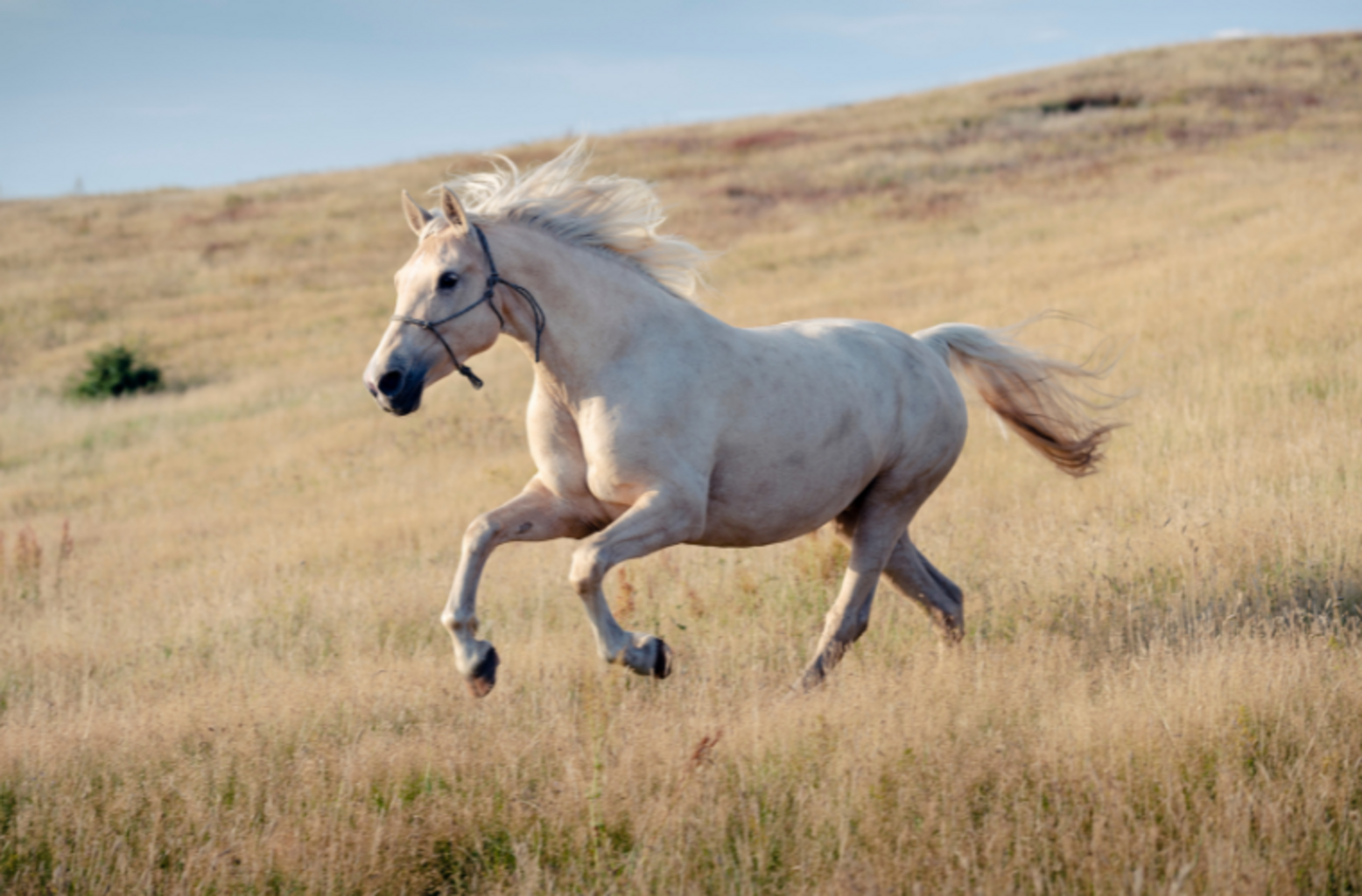Muscle Tension from Polysaccharide Storage Myopathy (PSSM) - Part 2
By Amelie Kokorsky
In the case of PSSM, it is assumed that a lot of glycogen but too many polysaccharides are stored in the muscles. In addition, the muscle cell is much more sensitive to insulin. Glucose is also absorbed from the blood to a greater extent in the muscle cells and stored there as glycogen. The natural breakdown and consumption of carbohydrates takes place normally, but too much glycogen is stored in the muscles.
It has been observed that especially strongly muscled horses such as Quarter Horses, Paint Horses or Appaloosa are affected by this disease. Nowadays, however, we know that other breeds such as Haflingers, Shettys or (heavy) warm-blooded animals, are becoming more and more ill. In most cases (up to 90%) it is a genetic disease, with mares being affected up to 70% more often than stallions or geldings. Since the disease can also be inherited, the affected horses should be excluded from breeding in order to prevent the spread of PSSM.
The symptoms of PSSM primarily manifest themselves in the musculoskeletal system of the affected horse. Noticeable symptoms are:
- Profuse sweating when doing little work, such as leading or light riding
- Sudden lameness (with no visible trigger)
- Trembling of the whole body or the strained muscles
- Rapid exhaustion after low exertion, such as a 10 minute trot
- The horse shows little motivation and looks very listless
- Muscles in the lumbar and croup areas are hardened
- Sometimes myoglobinuria (= myoglobin is excreted in the urine) occurs
Symptoms often worsen with increasing exertion. The horses can open their stance and stand in the sawhorse-like posture. Immediately after exertion, symptoms of cross crotch (see blog post on the subject of muscles in horses - part 3) and colic can occur.
The intensity of exercise after which the symptoms mentioned above appear can vary greatly. In some horses, symptoms have been observed after walking for 10 minutes. Other horses could be ridden for up to 40 minutes under normal stress and only then showed the typical symptoms.
If you suspect PSSM, you can have a muscle biopsy, a blood count (if it is acute) or a gene test as a diagnosis. The veterinarian should be consulted in any case.
In many cases, the affected animals can be helped by changing their feed. If you also optimise the training, many horses showed hardly any or only slight symptoms. The performance of the affected animals could almost be restored. However, one must note that a change in feed should be maintained for the lifetime of the horse in order to prevent relapses.

As a first measure, the feeding should first be changed. The horse should be fed as little readily available carbohydrates as possible - that means no carrots, apples, bread, bananas, sugar cubes and beet pulp.
When feeding grain you should also be careful which type and in what quantities you are feeding. If the owner would like to feed grain, then one should resort to crushed barley and feed it strictly according to the intensity of the training. If the horse has done a lot of work, you can feed a little more barley; very little for light work. If you only lead the horse at a step or if you go for a ride at a step, you should not feed the animal grain in order to prevent a PSSM attack.
The horse can be fed with good hay ad libitum, mineral feed and a salt lick. This diet usually already covers the horse's basic needs, so that additional feed is not necessary.
In horses suffering from PSSM, one should always remember that they can get energy from the feed. With too much energy and thus too much glucose in the blood, the risk of a PSSM attack increases, so the amount of carbohydrates should be strictly reduced.
Stiefel Organic-Mineral is ideal as a mineral feed. Stiefel Organic-Mineral is grain-free, but still provides the horse with all essential trace elements and vitamins.
Since the kidneys of PSSM diseased horses are often more stressed, they should also be given the best possible support when feeding. This can be done through Stiefel kidney herbs , Stiefel rose hips, or Stiefel meadowsweet. Stiefel kidney herbs are a selected blend of herbs that can support the kidneys in their functioning. The rose hips can also support kidney function, as they have a slightly diuretic effect. Meadowsweet has similar properties. This plant also has a slightly diuretic and detoxifying effect, so that it can support the kidneys in a natural way.
If PSSM is diagnosed in a horse, the animal should first be taken out of training and placed in a paddock that is as extensive as possible, preferably a paddock with a lot of natural movement. The change in feeding should take place as soon as possible. All easily available carbohydrates are removed from the feed plan and the above-mentioned plants and minerals are supplemented if necessary. Once this has been done, you can slowly start moving the horse. At the beginning, you should start very gently, with 10 minutes of step leading. The training program can then be increased slowly over several weeks until the horse can trot on the lunge for 30 minutes. At least two steps of 5 minutes should be taken within the 30 minutes. If the horse manages this stress without showing the typical symptoms of a PSSM disease, you can slowly start riding again. Here, too, you should make sure to get the animal used to the stress very slowly and always keep an eye on the symptoms of PSSM. If a typical PSSM symptom occurs, exercise should be immediately slowed, taking a few steps back in your training plan so that the intensity decreases again. Consistency and patience play a very important role in feeding and exercise. If you have progressed so far in training that the horse can be worked over a longer period of around 40-45 minutes, you can also feed Stiefel linseed oil to meet the horse's now increased energy requirements. Since linseed oil is a source of energy from fats and not from carbohydrates, the horse should not have any problems with a PSSM attack. Nevertheless, caution is advised with the dosage here too!
Look forward to part 3 with the topic "Muscle tension through cross crate"
Latest reviews
-
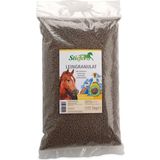 5.0 (7)
5.0 (7)Stiefel Linseed Granules, 5 kg
- Ready-to-feed linseed cake
- High mucilage content
- Reduced fat content due to cold pressing
£17.80 (£3.56 / kg)Delivery by January 08
-
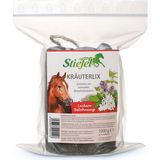 4.8 (10)
4.8 (10)Stiefel Kräuterlix Horse Lick, 1 kg
- Lick stone with bronchial herbs
- A tasty reward
- With attached cord to tie it up
£13.33 (£13.33 / kg)Delivery by January 08
-
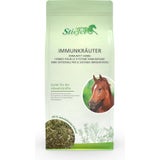 5.0 (7)
5.0 (7)Stiefel Immunity Herbs , 1 kg
New!- 100% natural herbal mixture
- Immunity herbs
- Good for the body's defences
£22.27 (£22.27 / kg)Delivery by January 08
-
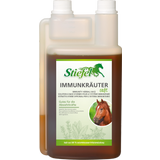 4.8 (6)
4.8 (6)Stiefel Immunity Herbal Liquid, 1 l
Bestseller- To support the immune system
- Made of 100% natural herbs
- No added sugar
£15.12 (£15.12 / l)Delivery by January 08
-
Great Britain: Free standard delivery from £79.90
-
Free
returns Secure payments
with SSL encryption technology

